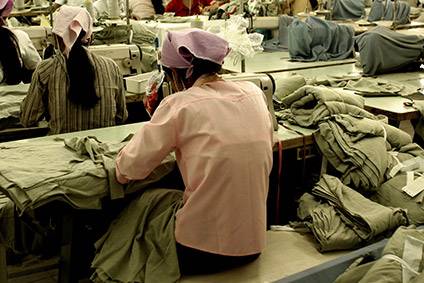
Female migrants are being exploited by garment factories in India supplying to international fashion brands such as Benetton, Gap Inc, and Levi Strauss, a new report claims, with many subjected to conditions of modern slavery.
The conclusions from the ‘Labour Without Liberty – Female Migrant Workers in Bangalore’s Garment Industry‘ report, published by the Indian Garment Labour Union, the India Committee of the Netherlands and Clean Clothes Campaign, highlights the pressure for low wages facing garment factories.
In Bangalore, India’s biggest garment producing hub, young women are said to be recruited with false promises about wages and benefits. Their living conditions in hostels are “poor” and their freedom of movement is “severely restricted”. Claiming to be at least 18, many workers look much younger.
The study found that five out of the eleven International Labour Organization (ILO) indicators for forced labour exist in the Bangalore garment industry: abuse of vulnerability; deception as a result of false promises (wages etc); restriction of movement in the hostel; intimidation and threats; and abusive working and living conditions. Some of these aspects are also felt to a certain extent by the local workforce, but are more strongly experienced by migrant workers.
The three factories researched for the report are understood to belong to the largest garment manufacturing companies in Bangalore. Together they employ more than 4,000 workers in various units in the country. Their buyers include Abercrombie & Fitch, Benetton, C&A, Calvin Klein and Tommy Hilfiger (both PVH Corp), Columbia Sportswear, Decathlon, Gap, H&M, Levi Strauss, and Marks & Spencer.
As the report points out, most of these brands have a Code of Conduct that prohibits forced labour, child labour and other labour rights violations.

US Tariffs are shifting - will you react or anticipate?
Don’t let policy changes catch you off guard. Stay proactive with real-time data and expert analysis.
By GlobalDataIn responding to an India Committee of the Netherlands (ICN) report ‘Unfree and Unfair’ from January 2016 on the living and working conditions of migrants in Bangalore, C&A, Gap, H&M and PVH responded with some concrete commitments. Brands like Benneton and Levi, however, “do not acknowledge the issue,” Clean Clothes Campaign says.
“Though there has been research by them affirming the findings of ‘Unfree and Unfair’ and a meeting with suppliers, after almost two years most of their commitments still have to be put in practice,” it says of C&A, Gap, H&M and PVH.
While official statistics on migrants do not exist, trade unions estimate there are between 15,000 and 70,000 migrant women from northern states working in the Bangalore garment industry. Before travelling to the factories, they are trained in skill development centres in Jharkhand or Odisha. These centres are often part of government sponsored schemes, which fall under Skill India.
Skill enhancement is one of the pillars of ‘Make in India’, Prime Minister Modi’s major initiative to create employment opportunities and stimulate economic growth.
The publication of the report comes just weeks after an investigation by The Guardian found women factory workers were being held captive by garment suppliers.
German fashion brand Hugo Boss highlighted an instance of forced labour it had identified at a finished goods supplier in India in its 2016 sustainability report, where it said employees were prevented from leaving the company’s premises at any time.
After the audit, the retailer said an action plan was defined in order to resolve the situation immediately, which it said it was monitoring “very closely.”




